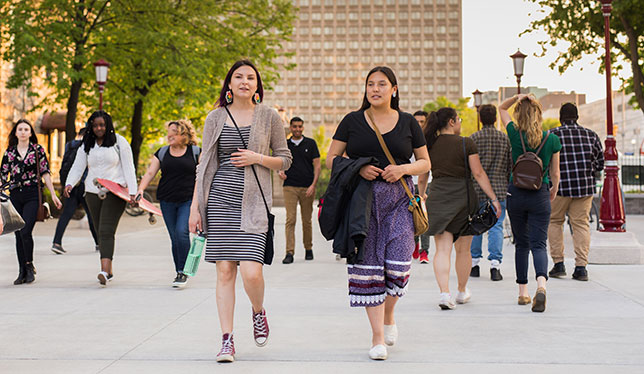Universities Canada has released the results of its latest survey on the services and programs for Indigenous students offered at its member institutions. The survey also catalogues universities’ progress towards reconciliation.
Among the findings: more than 90 percent of universities offer financial aid earmarked for Indigenous students; 85 percent of universities report partnerships with Indigenous postsecondary institutions, communities and organizations to foster dialogue and reconciliation; 87 percent of universities are working to increase Indigenous representation in their leadership ranks; and at least two-thirds of universities have curricula with specific Indigenous programming in education, law, nursing and medicine.

“There is still a long journey ahead to meaningful reconciliation in Canada, and universities are ready and willing partners,” says Wendy Therrien, director, external relations and research, at Universities Canada (publisher of University Affairs). The latest survey results show that Canada’s universities “are supporting the success of Indigenous students and researchers, working with Indigenous partners and combatting systemic racism in their communities,” says Ms. Therrien. But while these results are promising, she says, universities acknowledge that “significant work still lies ahead.”
In 2015, following the release of the Truth and Reconciliation Commission’s Calls to Action, the heads of Canada’s universities adopted a set of 13 Principles on Indigenous Education, developed in consultation with Indigenous leaders. Since then, Universities Canada has conducted a survey of universities’ Indigenization efforts every two years. The newly released data is from the 2019 survey. (The 2017 results can be viewed here.)
Answering the calls
The TRC’S Calls to Action appealed directly to universities to incorporate Indigenous histories, cultures and realities into the curricula that will shape Canada’s future professionals in specific fields that impact the lives of Indigenous peoples. According to the survey:
- Over 80 percent of universities have implemented or are implementing curriculum in education programs to empower future teachers to teach about residential schools, treaties and the contributions of Indigenous people to Canada (Call 62, i).
- Roughly two-thirds of universities with law schools are incorporating or have incorporated a mandatory course on Indigenous peoples and the law (Call 28).
- More than two-thirds of universities are including or have included a mandatory course on Indigenous health issues in their medical and nursing programs (Call 24).
Supporting Indigenous learners
The survey found universities offer many specialized services for Indigenous learners to increase access, retention and success. These types of services will only increase in importance as Indigenous learners face unique challenges during the COVID-19 pandemic, Ms. Therrien noted. The survey found:
- More than 90 percent of universities offer financial aid specifically earmarked for Indigenous students, including 80 percent that offer need-based bursaries and 76 percent that offer merit-based scholarships.
- Roughly three-quarters of universities offer academic and general counselling services specifically for Indigenous students.
- Nearly 60 percent of universities offer peer-to-peer mentoring programs to create community on campus for Indigenous students.
- Roughly two-thirds of universities have a dedicated online hub for Indigenous student services.
- More than three-quarters offer Indigenous student gathering spaces for when it is safe to return to campus.
Universities are also working with Indigenous partners to ensure quality learning opportunities, says Ms. Therrien:
- 85 percent of universities report partnerships with Indigenous postsecondary institutions, communities, and/or organizations to foster dialogue and reconciliation. One area of partnership is collaborating on courses and programs that keep Indigenous languages, cultures and histories strong.
- Nearly 200 Indigenous language courses covering more than 30 languages are available at Canadian universities.
- Nearly 70 percent of these courses are co-developed with an Indigenous community or organization and nearly 60 percent include guidance from elders.
- These programs also offer flexibility for Indigenous learners, with options to pursue studies on or off-campus, in community or online. Roughly one-third of programs that include an Indigenous focus, or are designed specifically for Indigenous students, feature an option delivered in an Indigenous community.
Internal efforts at reconciliation
The survey shows universities are also making internal changes within their institutions to ensure their leadership, governance, teaching and research activities acknowledge and incorporate Indigenous expertise and address internal systemic barriers.
- 80 percent of universities have strategic plans for advancing reconciliation.
- 87 percent of universities are working to increase Indigenous representation in leadership.
- 70 percent are working to increase representation among faculty.
- 70 percent of universities are incorporating Indigenous knowledge and methods into both teaching and research.
- 85 percent of institutions actively foster intercultural engagement, including events, cultural activities and cultural competency training to create a welcoming and inclusive campus environment for Indigenous learners, faculty and community members.
Universities Canada hosts an online directory and searchable database of Indigenous academic programs, as well as services and programs designed specifically for Indigenous students.